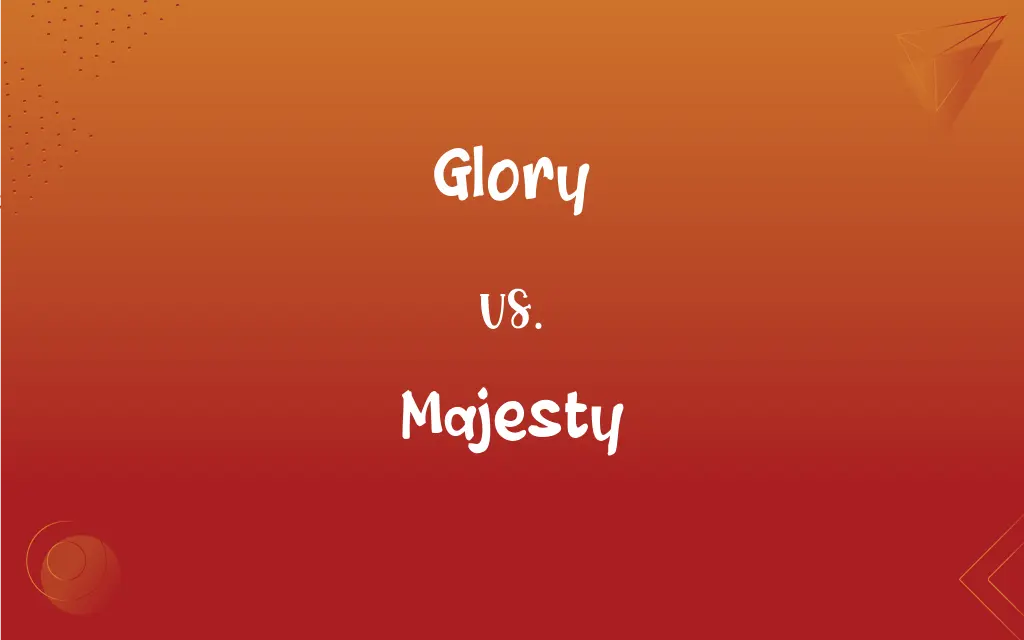Glory vs. Majesty: What's the Difference?
Edited by Aimie Carlson || By Harlon Moss || Updated on November 13, 2023
Glory refers to high renown or honor won by notable achievements, whereas majesty denotes sovereign power, authority, or dignity.

Key Differences
Glory often implies a state of high honor, respect, or distinction, usually earned through achievements or notable qualities. Majesty, on the other hand, connotes grandeur and awe, often associated with sovereigns or deities, emphasizing dignity and greatness.
Glory is commonly used to describe the splendor or greatness of someone's achievements or character. Majesty is more associated with the impressive beauty or scale of something, often used in addressing or describing royalty or something awe-inspiring.
Glory carries an emotional undertone of pride and admiration, often linked with accomplishments or brilliance. Majesty evokes a sense of awe, reverence, and respect, particularly towards something grand or powerful.
Glory is frequently seen in contexts celebrating human endeavors, such as in sports or historical achievements. Majesty is often used in contexts related to the natural world, architecture, or the regal status of individuals.
Historically, glory has been a term linked with heroic deeds and fame, whereas majesty has been predominantly used in the context of royal courts and divine references, symbolizing supreme stature or authority.
ADVERTISEMENT
Comparison Chart
Connotation
Honor, fame
Grandeur, sovereignty
Common Usage
Achievements, heroism
Royalty, awe-inspiring beauty
Emotional Tone
Pride, admiration
Reverence, respect
Context
Human endeavors, history
Nature, royalty, divinity
Historical Significance
Heroic deeds, fame
Royal dignity, divine authority
ADVERTISEMENT
Glory and Majesty Definitions
Glory
Glory refers to splendid beauty or magnificence.
The glory of the sunset left everyone speechless.
Majesty
Majesty is a term of respectful address for monarchs.
Subjects bowed before their majesty, the king.
Glory
Glory means high praise, honor, or distinction.
Athletes compete for glory in the Olympics.
Majesty
Majesty refers to impressive beauty or scale.
The majesty of the mountains overwhelmed the hikers.
Glory
Glory is the fame gained by a remarkable achievement.
The scientist achieved glory with her groundbreaking discovery.
Majesty
Majesty is the sovereign power or authority of a monarch.
The queen's majesty was evident in her commanding presence.
Glory
In religious contexts, glory can mean thanksgiving or praise.
The congregation sang songs of glory to their deity.
Majesty
In legal contexts, majesty can refer to a sovereign state.
The matter was brought before His Majesty's court.
Glory
In spiritual terms, glory can signify the bliss of heaven.
Believers aspire to eternal glory after life.
Majesty
Sovereign power, dignity, or grandeur
The majesty of the royal couple.
Glory
Great honor, praise, or distinction accorded by common consent; renown.
Majesty
Supreme authority or power
The majesty of the law.
Glory
Something conferring honor or renown.
Majesty
A royal personage.
Glory
A highly praiseworthy asset
Your wit is your crowning glory.
Majesty
Majesty Used with His, Her, or Your as a title and form of address for a sovereign.
Majesty
Magnificence or splendor
The majesty of the Rockies.
Majesty
The quality of being impressive and great.
The majesty of the Great Pyramids
Majesty
The dignity and authority of sovereign power; quality or state which inspires awe or reverence; grandeur; exalted dignity, whether proceeding from rank, character, or bearing; imposing loftiness; stateliness; - usually applied to the rank and dignity of sovereigns.
The Lord reigneth; he is clothed with majesty.
No sovereign has ever represented the majesty of a great state with more dignity and grace.
Majesty
Hence, used with the possessive pronoun, the title of an emperor, king or queen; - in this sense taking a plural; as, their majesties attended the concert.
In all the public writs which he [Emperor Charles V.] now issued as King of Spain, he assumed the title of Majesty, and required it from his subjects as a mark of respect. Before that time all the monarchs of Europe were satisfied with the appellation of Highness or Grace.
Majesty
Dignity; elevation of manner or style.
Majesty
Impressiveness in scale or proportion
Majesty
Majesty signifies dignity or greatness.
The ceremony was conducted with great majesty.
FAQs
Can 'glory' imply a physical beauty?
Yes, it can refer to splendid beauty or magnificence.
What is 'glory'?
Glory is renown or honor won by notable achievements.
How is 'majesty' used in law?
It can refer to the authority or dignity of a sovereign state or monarch.
Is 'glory' a common term in literature?
Yes, particularly in historical or heroic narratives.
Can 'glory' be used in a religious context?
Yes, glory can denote praise or thanksgiving in religious settings.
Does 'glory' always relate to positive achievements?
Typically, yes, though it can sometimes have neutral or negative connotations depending on context.
What does 'majesty' mean?
Majesty refers to sovereign power, grandeur, or dignity.
Is 'majesty' only used for royalty?
Primarily, but it can also describe anything awe-inspiring or grand.
What is an example of 'glory' in sports?
Winning a gold medal at the Olympics is often seen as achieving glory.
Can 'majesty' be used ironically?
Yes, in some contexts, it can be used ironically to indicate a lack of grandeur.
What is the difference between 'majesty' and 'majestic'?
'Majesty' is a noun denoting grandeur, while 'majestic' is an adjective describing something grand or impressive.
Is 'glory' often associated with war?
Historically, yes, but its usage has broadened over time.
What is a synonym for 'majesty'?
Grandeur, sovereignty, or regality are common synonyms.
What's an example of 'majesty' in nature?
The grandeur of a mountain range is often described as its majesty.
Can 'glory' be used metaphorically?
Yes, it often symbolizes high esteem or honor in various contexts.
How is 'majesty' used in architecture?
Buildings with grand and awe-inspiring designs are often described as having majesty.
Can 'majesty' be used in a non-royal context?
Yes, it can describe anything grand or awe-inspiring, like nature.
Is 'glory' a versatile term?
Yes, it's used in diverse contexts, from sports to spirituality.
Can 'majesty' refer to a person's demeanor?
Yes, if they carry themselves with dignity and grandeur.
How does 'glory' differ from 'fame'?
Glory is more closely tied to honor and high respect, while fame can be more neutral.
About Author
Written by
Harlon MossHarlon is a seasoned quality moderator and accomplished content writer for Difference Wiki. An alumnus of the prestigious University of California, he earned his degree in Computer Science. Leveraging his academic background, Harlon brings a meticulous and informed perspective to his work, ensuring content accuracy and excellence.
Edited by
Aimie CarlsonAimie Carlson, holding a master's degree in English literature, is a fervent English language enthusiast. She lends her writing talents to Difference Wiki, a prominent website that specializes in comparisons, offering readers insightful analyses that both captivate and inform.































































